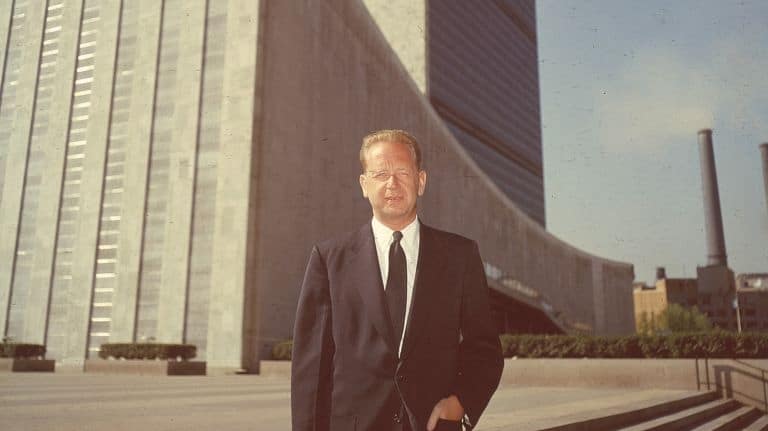Dag Hammarskjöld was a Secretary General of the United Nations, a Nobel laureate, a staunch anti-imperialist, and, according to a certain Jack Kennedy, “the greatest statesman of our century.” On September 18, 1961, while en route to a small Rhodesian airport, his plane crashed, killing all on board. In his newest film, Cold Case Hammarskjöld, Danish documentarian and provocateur Mads Brügger asks whether Hammarskjöld was assassinated, and stumbles upon a far more salacious story than he planned.
Over the next two hours, Brügger and his partners in uncovering crime lay out a grand conspiracy, one involving old-timey sailor outfits, murdered biologists, code-named fighter pilots, jungle laboratories, Belgian mining conglomerates, the CIA, and a plot to infect thousands of black South Africans with HIV. At the heart of the mystery sits a paramilitary organization called the South African Institute of Maritime Research (SAIMR), and its enigmatic leader, Keith Maxwell.
Secret societies being what they are, the bulk of Brügger’s findings fall more under the umbrella of well-researched conjecture than proven fact. Working initially with only a small trove of official documents unearthed by Desmond Tutu’s Truth and Reconciliation committee, Brügger spends much of the first act of the film tracing false leads, dead ends, and uncooperative witnesses. What’s more, the conspiracy’s sprawl demands total competence from every agent in its malevolent sprawl. And yet Brügger takes great pain to expose SAIMR and its associates as naught more than thuggish bunglers; stupid, violent men incapable of subtlety or cunning. Says one espionage expert of SAIMR’s growing paper trail, “This is not professional.” Even Brügger’s key witness, a mercenary who claims to have personally known Maxwell and his genocidal schemes, offers no documentation of his time in SAIMR, and instead invites the audience and the UN to take him at his word.
However, even if Brügger struggles to definitively connect SAIMR and Maxwell’s to specific crimes, Cold Case Hammarskjöld creates an effective portrait of an underexamined moment in history. Brügger and his team interview European mercenaries, American spies, and South African generals. They all casually describe participating in military coups, assassinations, foreign invasions, and fraudulent healthcare schemes, some with the support of the British and American governments, and all with the explicit goal of protecting Western commercial interests, Apartheid, and other white-supremacist structures. Contemporary Americans and Europeans often pretend that the legacy of colonialism long since died, but Brügger and his team dismiss such sentiments as bunkum.
Brügger’s most telling interrogation is therefore not of any evil old men, but of himself, his own work, and his audience. In entitling the film Cold Case Hammarskjöld, Brügger frames it as a work of True Crime, and therefore commercial entertainment, not journalism. About halfway through the film, Brügger confesses that he holds no great affection for Hammarskjöld or his anti-colonial mission. He dedicated six years of investigation to Hammarskjöld and SAIMR because exposing Belgian mercenaries is fun. Humiliating incompetent schemers is fun. Dressing up in pith helmets and the all-white regalia of a genocidal militia is (to Brügger, anyway) fun. The documentary team could have assembled his research into a dry newspaper report (and indeed they did – Brügger contributed to an investigation of Keith Maxwell and SAIMR that ran in the Guardian), but reading the Guardian is by no means fun (thanks for supporting local journalism!). So Brügger made a movie, one that foregrounds his creative process, his personality, and his frustrations. When he films himself dictating his shooting script to a pair of African secretaries or passing shovels to day laborers so that he can attend to his own minor blisters, he lays bare the exploitative ickiness inherent to the genre. In co-opting a titillating story of murder, state-sponsored terrorism, and personal misery to build his own profile as an important truth-teller, Brügger anoints himself as a spiritual heir to Truman Capote and Sarah Koenig. At least he has the decency to wink.
Cold Case Hammarskjöld is currently playing at the IFC Center, and is available to rent on Amazon Prime Video, Youtube, Google Play, and Vudu.
3/4 Stars










